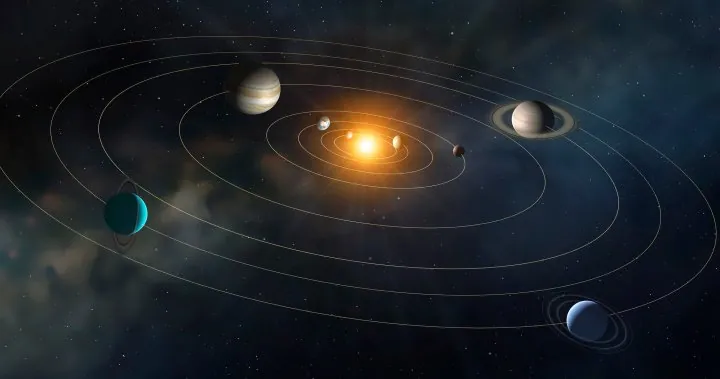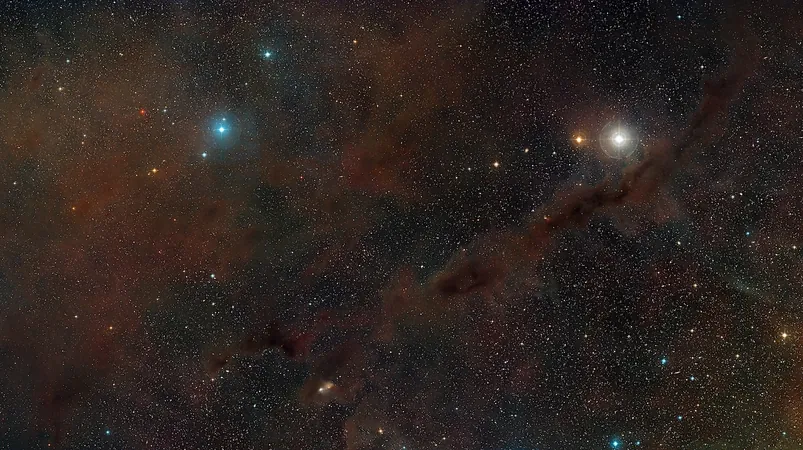
Is Planet 9 Finally on the Horizon? Astronomers Discover New Candidate!
2025-05-06
Author: Olivia
The Search for Planet 9 Heats Up
For years, the astronomical community has been on a quest to uncover a so-called "ninth planet" in our solar system, especially after Pluto's demotion to dwarf planet status. Recently, researchers have identified a compelling candidate that could reignite the debate.
A Glimpse into the Kuiper Belt
The enigmatic Planet 9 has long been theorized as a Neptune-sized entity, potentially residing at the farthest reaches of our solar system. Its existence might explain the peculiar clustering and orbits of distant objects found in the Kuiper Belt, located beyond Neptune. However, pinpointing such a massive body has proven to be a daunting challenge.
A Mysterious Dot in the Sky
A new study, set to publish in the *Publications of the Astronomical Society of Australia*, has sparked fresh excitement. Scientists reported finding a curious dot on infrared images collected over a span of 23 years, suggesting movement consistent with a large, distant planet.
Lead author Terry Phan, a doctoral student in astronomy at National Tsing Hua University in Taiwan, expressed his exhilaration, stating, "I felt very excited. It’s motivated us a lot." However, the study itself faces skepticism, as researchers acknowledge that more data is necessary to fully map the candidate's orbit.
Skepticism and Scientific Rigor
Mike Brown, the astronomer who first proposed the Planet 9 hypothesis in 2016, emphasizes the need for stronger evidence. He noted that current data suggests the potential candidate's orbit is tilted at about 120 degrees from the solar system's plane, conflicting with expectations that it would be tilted between 10 to 15 degrees.
This disparity leaves room for doubt. Brown cautioned, "This mismatch doesn’t mean it’s not there, but it means it’s not Planet 9. I don’t think this planet would have the effects on the solar system that we think we’re seeing." His formidable reputation as the "Pluto Killer" adds weight to his analyses.
Planet 9: What the Future Holds
NASA has even engaged with these hypotheses, describing a hypothetical Planet 9 as a Neptune-sized titan that might orbit the Sun at extraordinary distances—20 to 30 times farther than Neptune—with a mass between five to ten times that of Earth. It could take between 10,000 and 20,000 Earth years to complete one orbit.
A New Eye on the Cosmos
While the existence of Planet 9 remains an open question, hope is on the horizon. The Vera C. Rubin Observatory, currently under construction in Chile, promises to revolutionize our view of the night sky. Equipped with the world's largest digital camera, it will probe deeper into space than any telescope before it.
Brown expressed enthusiasm for this project, indicating it could provide the crucial data needed to confirm or refute the Planet 9 hypothesis. "If you were to give me a budget to build a telescope to find Planet 9, I’d create the Rubin Observatory," he declared.
Conclusion: A Journey Continues
As we await further observations, the quest for Planet 9 continues to capture the imagination of scientists and enthusiasts alike. Whether it turns out to be a long-lost planet or remains an intriguing mystery, one thing is certain: the universe still holds secrets waiting to be discovered!









 Brasil (PT)
Brasil (PT)
 Canada (EN)
Canada (EN)
 Chile (ES)
Chile (ES)
 Česko (CS)
Česko (CS)
 대한민국 (KO)
대한민국 (KO)
 España (ES)
España (ES)
 France (FR)
France (FR)
 Hong Kong (EN)
Hong Kong (EN)
 Italia (IT)
Italia (IT)
 日本 (JA)
日本 (JA)
 Magyarország (HU)
Magyarország (HU)
 Norge (NO)
Norge (NO)
 Polska (PL)
Polska (PL)
 Schweiz (DE)
Schweiz (DE)
 Singapore (EN)
Singapore (EN)
 Sverige (SV)
Sverige (SV)
 Suomi (FI)
Suomi (FI)
 Türkiye (TR)
Türkiye (TR)
 الإمارات العربية المتحدة (AR)
الإمارات العربية المتحدة (AR)